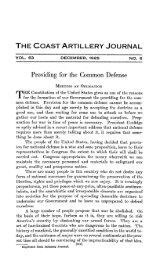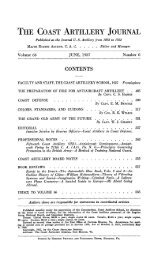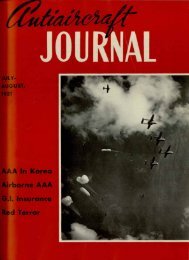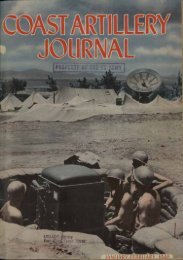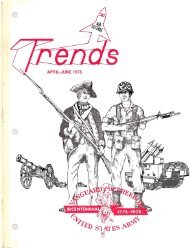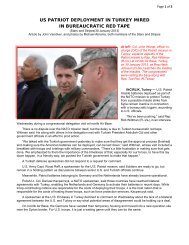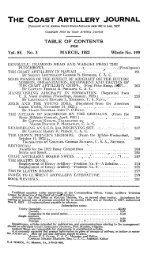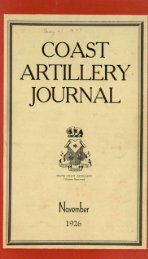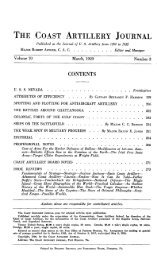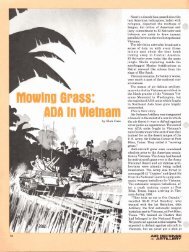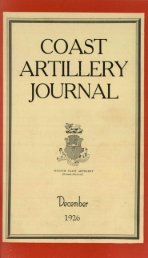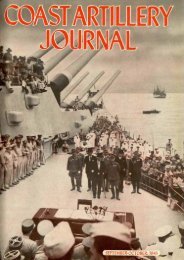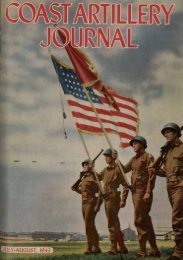Activation of new aaa units - Air Defense Artillery
Activation of new aaa units - Air Defense Artillery
Activation of new aaa units - Air Defense Artillery
You also want an ePaper? Increase the reach of your titles
YUMPU automatically turns print PDFs into web optimized ePapers that Google loves.
1<br />
I<br />
BOOK REVIEWS<br />
The Road 10 War J94J<br />
THE MEMOIRS OF CORDELL HULL.<br />
Two Volumes. The Macmillan Company.<br />
1804 Pages; Index.<br />
Cordell Hull's massive memoirs cover<br />
the period from his birth in a rented log<br />
cabin in Overton County, Tennessee, in<br />
1871 to his resignation from the cabinet<br />
on November 30, 1944. After a distinguished<br />
career as a Democratic Party<br />
leader, judge, congressman, and senator,<br />
Hull was chosen as Secretary <strong>of</strong> State in<br />
the first cabinet <strong>of</strong> Franklin D. Roosevelt.<br />
He held that <strong>of</strong>fice for nearly twelve years,<br />
almost twice as long as any other man in<br />
American history.<br />
Hull carne from a.stalwart and forthright<br />
family. During the Civil War his<br />
father was shot through the head and left<br />
for dead by a "Yankee guerrilla" named<br />
Stepp. After a recovery which seems miraculous,<br />
his father tracked down Stepp<br />
after the war and shot him down without<br />
a Word. Cordell Hull was something <strong>of</strong> a<br />
fighter himself; he led an infantry company<br />
in the 4th Tennessee Volunteers during<br />
the Spanish American \-Var.<br />
Although the Constitution provides that<br />
the foreign policy <strong>of</strong> the United States is<br />
formulated by the President and the Senate,<br />
Hull made his views on the function<br />
<strong>of</strong> the Secretary. <strong>of</strong> State clear to Mr.<br />
~OOsevelt before accepting <strong>of</strong>fice. He said:<br />
If I accept the Secretaryship <strong>of</strong> State, I<br />
do not have in mind merely carrying on<br />
COrrespondence with foreign governments.<br />
What I have in mind was that it would be<br />
~y duty to aid the President in every pos-<br />
SIble way in the conduct <strong>of</strong> foreign policy.<br />
... I would foresee and appraise to the<br />
~nest possible extent questions and prob-<br />
"'II1S arising ... and would formulate my<br />
OWn ideas <strong>of</strong> policy .... I would then<br />
recommend such policy to the President<br />
for his approval or disapproval and suggest<br />
necessarv action. The President himlf<br />
would, .<strong>of</strong> course, suggest a policy<br />
on a given situation :l~ any time ... and<br />
I would develop all facts in relation to it<br />
and then, if he approved, carry it out<br />
through the State Department." These suggestions<br />
were accepted by the President,<br />
and in twelve years there was no serious<br />
misunderstanding between the two men.<br />
Like Stimson, Hull thought that Roosevelt<br />
was a great commander in chief and<br />
war President. Like Stimson, he also had<br />
difficulty in adjusting himself to the President's<br />
domestic and economic policies. He<br />
probably agreed with Stimson that Roosevelt<br />
was not a good administrator. His experience<br />
with Raymond Moley at the<br />
London Economic Conference in 1933<br />
made this clear. Hull did not favor the<br />
President's practice <strong>of</strong> sending a number<br />
<strong>of</strong> distinguished Americans abroad as his<br />
personal representatives because it undermined<br />
the prestige <strong>of</strong> our ambassadors. Not<br />
only that, Hull thought it was a waste <strong>of</strong><br />
time and energy. Once in a while the<br />
President listened to outsiders like Morgenthau<br />
on foreign policy matters, but Hull<br />
observed that these diversions wen~ rare<br />
and generally carne to nothing. Hull's place<br />
in history will be the more secure because<br />
Roosevelt did not seek out or act upon his<br />
advice on foreign policy matters con-<br />
nected with the Teheran and Yalta Conferences.<br />
The President considered these<br />
conferences as being primarily "military"<br />
in character.<br />
There was a tide ~f aggression running<br />
in the world when Hull took <strong>of</strong>fice in<br />
1933. The Nazis won an election that<br />
consolidated their hold on Germany and<br />
the Japanese occupied the capital <strong>of</strong> Jehol<br />
on the day he was sworn in. Hull admits<br />
that when he took <strong>of</strong>fice he had a<br />
strong conviction that Germany and Italy<br />
would plunge Europe into war and that<br />
"Japan had no intentions whatever <strong>of</strong><br />
abiding by treaties." Since the European<br />
dictators were not ready, Hull was first<br />
concerned with the Japanese conquest <strong>of</strong><br />
Northern China. He saw through the ab-<br />
surd plea that the United States should<br />
appease Japan and thus strengthen the<br />
liberals in order to prevent the military<br />
group from gaining complete control <strong>of</strong><br />
the Japanese government. This plea was<br />
raised at each <strong>new</strong> Japanese aggression<br />
and it has recently been revived by a<br />
school <strong>of</strong> writers who are trying to convince<br />
the American people that the war<br />
was unnecessary and brought about solely<br />
by our own action!<br />
Hull never favored neutrality as between<br />
right and wrong. He believed that a breach<br />
<strong>of</strong> the peace by an aggressor anywhere in<br />
the world affected American security.<br />
We should therefore impede the aggressors<br />
to safeguard our own peace. Under existing<br />
neutrality laws and the arms embargo,<br />
American neutrality was a boon to the aggressors.<br />
He tried hard in 1939 to convince<br />
certain isolationists that war was corning in<br />
Europe, but one <strong>of</strong> them, the venerable<br />
Senator Borah, declared that he had information<br />
superior to that <strong>of</strong> the State Department.<br />
\Vhen Hull invited Borah to<br />
visit the State Department and read the<br />
documents bearing on the European situation,<br />
the Senator declined. To Hull's<br />
way <strong>of</strong> thinking the world was not faced<br />
with a threat <strong>of</strong> regional war or an isolated<br />
conflict but "with an organized, ruthless,<br />
and implacable movement <strong>of</strong> steadily coxpanding<br />
conquest." \Ve could have peace<br />
and isolation for a time but only at the<br />
cost <strong>of</strong> total surrender.<br />
\Ve find some interesting footnotes to<br />
history in these volumes. Apparently Hull<br />
was the real author <strong>of</strong> the 50,000-planesa-year<br />
program announced by Presiden:<br />
Roosevelt on May 16, 1940, for in May<br />
1940 he urged the President to announce<br />
such a program. Like Hull's associates with<br />
whom he had previously discussed this<br />
program, Roosevelt was "speechless" at the<br />
size <strong>of</strong> the effort but immediately made the<br />
project his own. Hull said that throughout<br />
the period <strong>of</strong> crisis and war he was more<br />
confident about our productive capacity



